 MyDogBreeds
MyDogBreeds Welsh Springer Spaniel is originated from United Kingdom but Great Dane is originated from Germany. Welsh Springer Spaniel may grow 38 cm / 14 inches shorter than Great Dane. Welsh Springer Spaniel may weigh 70 kg / 154 pounds lesser than Great Dane. Both Welsh Springer Spaniel and Great Dane has almost same life span. Welsh Springer Spaniel may have less litter size than Great Dane. Welsh Springer Spaniel requires Moderate maintenance. But Great Dane requires Low maintenance
Welsh Springer Spaniel is originated from United Kingdom but Great Dane is originated from Germany. Welsh Springer Spaniel may grow 38 cm / 14 inches shorter than Great Dane. Welsh Springer Spaniel may weigh 70 kg / 154 pounds lesser than Great Dane. Both Welsh Springer Spaniel and Great Dane has almost same life span. Welsh Springer Spaniel may have less litter size than Great Dane. Welsh Springer Spaniel requires Moderate maintenance. But Great Dane requires Low maintenance
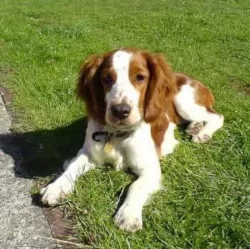 The Welsh Springer Spaniel is thought to be an old Land Spaniel similar to the English Springer Spaniel. They were pretty mush an unknown breed until they won a string of dog trials and became more popular. Following this surge the breed was recognized by the UKC in 1902 and were named the Welsh Springer Spaniel. No one really knows when the breed was developed and cannot be traced because of lack of documentation. They were brought to America in the early 1900’s and were recognized as a breed by the AKC (American Kennel Club) in 1906.
The Welsh Springer Spaniel is thought to be an old Land Spaniel similar to the English Springer Spaniel. They were pretty mush an unknown breed until they won a string of dog trials and became more popular. Following this surge the breed was recognized by the UKC in 1902 and were named the Welsh Springer Spaniel. No one really knows when the breed was developed and cannot be traced because of lack of documentation. They were brought to America in the early 1900’s and were recognized as a breed by the AKC (American Kennel Club) in 1906.
There are images of a dog looking a lot like the Welsh Springer Spaniel in old prints and pictures. The pictures are of a dog known as a Land Spaniel very much like the Welsh Springer Spaniel. These dogs were thought to be preserved by the Welsh and originally called the Welsh Starter. It was a hunting breed working with falcons.
At one point the breed was called the Welsh Spaniel and was also in the UK studbook as a Cocker Spaniel or a Welsh Cocker. There were several different types of Cocker Spaniels including the English Cocker, the Welsh Cocker, the Devonshire Cocker. The Welsh Cocker Spaniel was a solid dark color while the Welsh and Devonshire Cockers were liver colored.
Following World War II there were no dogs left in Wales or anywhere else in the United Kingdom whose parents were registered pedigree. The unregistered dogs were used to restart the breed and these dogs are the ancestors of the modern Welsh Springer Spaniel.
The breed is still rare with only 299 registered in the UK in 2016. They are listed now a vulnerable Native Breed.
 Known as the Deutsche Dogge or Apollo of dogs, the giant-breed Great Dane hails from Germany and not Denmark as many people believe.
Known as the Deutsche Dogge or Apollo of dogs, the giant-breed Great Dane hails from Germany and not Denmark as many people believe.
The large Great Dane has been around for about 400 years already. They descend from mastiff-like dogs, being needed to protect country estates.
In the 18th century, apart from watching over estates, they were also popular with the upper class for sport.
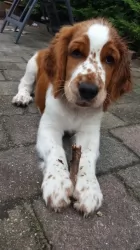 The breed is a medium size, solid and compact dog bred to work. Their forequarters are angled and there hindquarters are well developed. This is a very good looking breed that is only red with white markings. A hard working dog bred to hunt. They are slighter longer than tall and are not penalized as long as the height tis not greater than the length.
The breed is a medium size, solid and compact dog bred to work. Their forequarters are angled and there hindquarters are well developed. This is a very good looking breed that is only red with white markings. A hard working dog bred to hunt. They are slighter longer than tall and are not penalized as long as the height tis not greater than the length.
The tail in docked except in countries where it is illegal to do so. Their eyes should be brown. Noses are black or brown. The ears are small with a fethering like most setters. The show and field styles are the same. They are confused with the Engolish Springer Spaniel even though there are many differences. But both breeds are born to hunt and “spring” at the prey. They are smaller than the English Springer Spaniel and larger than the English Cocker Spaniel.
 The Great Dame is a tall, lean, athletic, muscular, elegant looking dog. He can stand anything between 76–86cm in height and weigh around 54–90kg. The large head is long and narrow, and the medium sized floppy ears can be left or they can be cropped.
The Great Dame is a tall, lean, athletic, muscular, elegant looking dog. He can stand anything between 76–86cm in height and weigh around 54–90kg. The large head is long and narrow, and the medium sized floppy ears can be left or they can be cropped.
The tail is long and held low. The coat is short and smooth and can be in several colors such as fawn, black or brindle.
Any kind of aggressiveness was bred out of the Great Dane and today he is a gentle giant of a dog, getting on well with other dogs, children and everyone in his human family.
Even though he is a gentle giant, he will still require training and socialization just because of his size. Then they become the devoted pet that they are so well known to be. You'll want to know that when he comes indoors, he will obey you when you tell him to lie-down, sit or come, otherwise his sheer size will see him knocking things accidentally off table-tops.
He is an intelligent dog and is eager to please so he'll learn easily. He craves human companionship, so make sure that your social Dane has plenty of interaction with you.
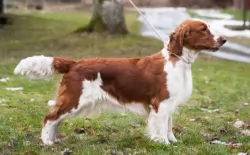 1Children friendliness yes they love their own children, but might be wary of others.
1Children friendliness yes they love their own children, but might be wary of others.
 The Great Dane is a large breed, bred to hunt wild boar. The intelligence, bravery and fearless nature of the dog meant that he was sought after for this task.
The Great Dane is a large breed, bred to hunt wild boar. The intelligence, bravery and fearless nature of the dog meant that he was sought after for this task.
Known as the Apollo of Dogs, you won’t find the Great Dane being used for hunting purposes anymore, being more suited as a companion dog.
While developed as a working breed, today he is a well balanced, intelligent, calm, loving, social, dependable dog that just wants to be loved by his human family and to provide love, loyalty and companionship back in return.
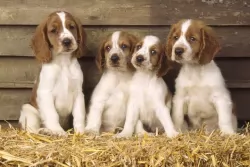 • Eye Diseases – Glaucoma can cause blindness; Entropian – eyelids curl inwards and can damage the cornea.
• Eye Diseases – Glaucoma can cause blindness; Entropian – eyelids curl inwards and can damage the cornea.
 Typically of giant dogs, the Great Dane doesn't have a particularly long life-span and will live to be about 8 to 10 years of age. Also, giant-breed dogs like this are susceptible to what is known as bloat.
Typically of giant dogs, the Great Dane doesn't have a particularly long life-span and will live to be about 8 to 10 years of age. Also, giant-breed dogs like this are susceptible to what is known as bloat.
You'll notice it because there is swelling of the stomach with gas buildup and also twisting of the stomach. It's a life-threatening condition and you'll need to get your dog to the vet as soon as possible. You can combat it by feeding him smaller, more frequent meals and perhaps buying a slow-feeder dish, forcing your hungry pet to eat slower and not gulp his food down.
Also, large dogs like this can develop hip dysplasia and with a dog like the Great Dane, it takes a while for the bones and joints to grow and then become stable. That is why it is important not to make him do any vigorous exercise till he is at least 18 months of age, as these exercises can put a lot of stress on the joints and bones which can lead to hip dysplasia later on.
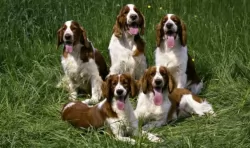 1Feeding the puppy active puppy. Feed breed specific or medium breed high quality dogfood. Feed ½ -3/4 cup in 2-3 meals
1Feeding the puppy active puppy. Feed breed specific or medium breed high quality dogfood. Feed ½ -3/4 cup in 2-3 meals
2.Feeding the adult active breed. Feed breed specific or medium breed high quality dogfood. Feed 1-1/2 cup in 1-2meals
4. Games and Exercises – Needs a secure fenced yard. Loves sports and outdoor activity. Agility, obedience, rally, tracking and loves to run, bike and hike.
 This is a large dog so you’ll notice that with commercially manufactured dog foods, there are those made specially for large- or giant breeds. It is important to choose the right dog food for his large size so that you can be sure he gets the right amount of nutrients in for him to grow strong and healthy.
This is a large dog so you’ll notice that with commercially manufactured dog foods, there are those made specially for large- or giant breeds. It is important to choose the right dog food for his large size so that you can be sure he gets the right amount of nutrients in for him to grow strong and healthy.
If you aren't sure about what food would most benefit your Great Dane, ask your vet. While it is important to also feed him quality home-made food and raw meat, when buying kibble for him,check the label of the food you buy him and make sure that the concentration of protein isn’t more than 23 to 25%.
Remember to provide him with a constant supply of fresh, cool water.
Brush your Great Dane’s coat at least twice a week. He has a short, smooth coat so it will be easy, and the brushing will keep his coat soft and shiny. Use this time to also check for fleas and ticks or lumps. You will also need to check his nails and trim them if they don’t trim down on their own.
Your Great Dane will need to be exercised every day if you want him to maintain his lean, muscular shape. It keeps him happy too. He isn’t the kind of dog though that you want to turn into your running partner when you go jogging or cycling. He can go on a walk and play in the garden, but the exercising shouldn’t be for long periods of time.
Every puppy needs to get to the vet for his first check-up when he is 6 weeks of age, and your Dane will also have to. As a puppy he will need to be de-wormed which will happen with this 6 week check up. He will also be vaccinated for distemper.